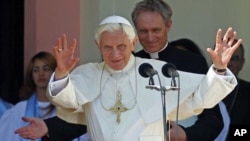Cuba's vice president says there will be no political reform in Cuba, despite calls by Pope Benedict XVI for more freedom and openness in the communist-ruled country.
Marino Murillo made his remarks as the pope arrived Tuesday in the capital, Havana, for a meeting with President Raul Castro and possibly with Fidel Castro, the long-time Cuban leader and elder brother of Raul.
"In Cuba, there will be no political reforms. In Cuba we are talking about the actualization of the Cuban economic model that will make our socialism viable. This has to do with the well-being of our people," said Murillo.
On Monday, the pontiff urged thousands of people at a Mass in the city of Santiago to help build a "renewed and open society."
Pope Benedict traveled to Havana after paying homage Tuesday to the patron saint of Cuba, the Virgin of Charity of El Cobre.
The pope visited the shrine holding the Virgin of Charity of El Cobre to mark the 400th anniversary of its discovery by fishermen. The doll-sized wooden statue is revered in Cuba and within the Roman Catholic Church.
Pope Benedict told an audience he has prayed for the needs of those who suffer and who are deprived of freedom, as well as those who are separated from their loved ones or are undergoing times of difficulty.
Watch related video
It is not clear whether the pope will also meet in Havana with Venezuelan President Hugo Chavez, who is in Cuba undergoing another round of radiation treatment for cancer.
The pontiff is scheduled to preside over an outdoor Mass Wednesday in Havana's Revolution Plaza.
The pope is on a three-day visit to Cuba, where his aim is to renew the faith in what was once an atheist state.
Pope Benedict is not expected to meet with Cuban dissidents, including the Ladies in White, a group of wives and mothers of the 75 dissidents who were jailed in a 2003 crackdown on government opponents.
The pope's visit comes 14 years after his predecessor, John Paul II, made the first papal visit to the communist-run island. The Roman Catholic Church has since grown to become the most influential institution next to the government. Cuba was officially an atheist state from 1959 until a constitutional change in 1992 abolished atheism as the state creed and called for separation of church and state. At that time, the Communist Party also lifted its ban on members with religious beliefs.
Cuba is the last stop on the pontiff's five-day Latin American trip that began last week in Mexico.
Some information for this report was provided by AP, AFP and Reuters.




